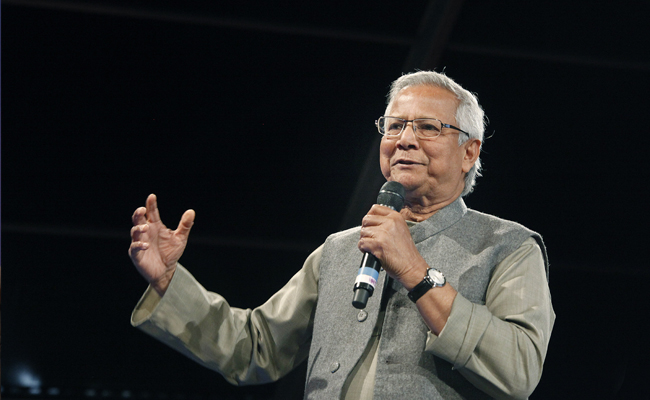Dhaka (PTI): Life has come full circle for Professor Mohammad Yunus, a well-known critic of Sheikh Hasina and persecuted by her regime, when the Nobel laureate became the head of the caretaker government after she resigned and fled to India.
The 84-year-old economist, globally recognised as ‘The Father of Microfinance,’ who flew down from Paris earlier in the day, was declared as the head of the interim government by President Mohammed Shahabuddin after dissolving Parliament Tuesday, a decision prompted by a demand by the Anti-Discrimination Student Movement.
Yunus had announced plans to form a political party in 2007 when the country was run by a military-backed government and criticised Bangladeshi politicians alleging they were only interested in money. He, however, did not follow through on that plan.
By a quirk of fate, on Thursday he took oath to lead a non-partisan, non-military caretaker government.
Yunus, who started as a Professor at national and international Universities, earned the 2006 Nobel Peace Prize and the Ramon Magsaysay Award in 1984 among scores of other international recognitions.
But back home, the founder of the Grameen Bank had been in a protracted row with Hasina's government due to obscure reasons while authorities initiated a series of investigations against him after she came to power in 2008.
Bangladesh authorities launched a review of the Grameen Bank's activities in 2011 and fired Yunus as its founding managing director on charges of violating the government retirement regulation.
Over the years, he was charged under dozens of cases. In January, a court sentenced Yunus to six months in jail on charges of labour law violation.
On June 10 this year, a Dhaka court prosecuted Yunus and 13 others - currently out on bail - for embezzling as it rejected a plea for the dismissal of charges by the accused.
The prosecution accused Yunus and the others of embezzling Taka 250 million (about USD 2 million) from the workers welfare fund of Grameen Telecom, which owns a 34.2 per cent stake in Bangladesh's largest mobile phone operator, Grameenphone, a subsidiary of Norway’s telecom giant Telenor.
“She destroyed the legacy of her father Bangabandhu Mujibur Rahman. Bangladesh is liberated… We are a free country now,” Yunus told an Indian portal on Monday from Paris after news broke out of Hasina fleeing the country amid civil unrest.
Notwithstanding the Hasina government’s stand, Yunus continued to receive international accolades as was evident by the speech by Susanna B Afan, president of the Ramon Magsaysay Award Foundation, on June 27 this year at Manila.
Afan stated that the work by Yunus, globally recognised as ‘The Father of Microfinance’ has not just inspired similar projects in the Philippines, Indonesia and Pakistan but their respective founders too received the Ramon Magsaysay Award.
Born in pre-Independence India in 1940 in Chittagong, Yunus first studied at Dhaka University in Bangladesh, which was then East Pakistan; went as a Fulbright scholar to study economics at Vanderbilt University in the US and obtained PhD in economics in 1969.
The very next year, he became an assistant professor of economics at Middle Tennessee State University in the US but returned to Bangladesh to head the economics department at Chittagong University.
Earlier, in 1984, Yunus was awarded the Ramon Magsaysay Award for Community Leadership for “his pioneering efforts in enabling rural men and women to become economically self-sufficient through sound group-managed credit.”
The 2006 Nobel Peace Prize was awarded for his work in poverty alleviation and the empowerment of poor women through Grameen Bank where Yunus has “successfully melded capitalism with social responsibility” through the microcredit institution.
Apart from multiple national awards, Professor Yunus is the recipient of numerous international awards for his ideas and endeavours from countries including Sri Lanka, USA, Jordan, Sweden, Japan, The Netherlands, and South Korea.
Published on January 1, 1991, his autobiography, ‘Banker to the Poor: Microlending and the Battle Against World Poverty,’ has been translated into at least a dozen languages including French, Italian, Spanish, Japanese, Gujarati, Chinese and Arabic.
His sphere of influence was evident when in January, more than 241 global leaders, including over 125 Nobel Laureates and former US President Barack Obama, had expressed their concerns via an open letter to Hasina over Yunus’ “continuous judicial harassment and potential jailing.”
With the regime change, it remains to be seen what will be the fate of over 150 other cases, including the major corruption charges that Yunus faces. Earlier, those could have seen him jailed for years if found guilty while the economist has denied all the wrongdoing.
In June this year, Yunus was interviewed by Bonikbarta.net when he was asked about the growing Western pressure on democracy and human rights in Bangladesh.
“What people from the West want is not a consideration for me. What we have to consider is whether we want democracy, human rights and an independent press. ... Why should we let them impose their will on us?” he said.
“Every country will frame its foreign policy on the basis of its own rules. We have to be clear on what we want. Establishing human rights and a free press are important for us,” he added.
Two months later, he landed in Hasina’s shoes, albeit as a caretaker for now.
When one clicks on Yunus’ own website, the very first quote of the Nobel laureate that greets you is, “If you imagine, Some day it will happen. If you don't imagine, It will never happen.”
For a person who had dreamed of a poverty-free Bangladesh, Yunus perhaps, may have never imagined that one day he would be heading his country.
Let the Truth be known. If you read VB and like VB, please be a VB Supporter and Help us deliver the Truth to one and all.
New Delhi (PTI): Police here have busted a crime syndicate involved in traffic fraud and extortion, arresting three people including the alleged mastermind who sold fake stickers to help commercial vehicles bypass no-entry restrictions, an official said on Saturday.
The police said they dismantled a third organised syndicate linked to traffic-related frauds, with the arrest of Rinku Rana alias Bhushan, his associate Sonu Sharma and Mukesh Kumar alias Pakodi, who was also connected to another extortion syndicate.
According to the police, Rinku Rana was running a well-organised network that facilitated the movement of commercial goods vehicles during restricted hours by selling fake 'marka' or stickers for Rs 2,000 to Rs 5,000 per vehicle every month. The stickers were falsely projected as authorisation to evade traffic challans.
During raids, the police recovered Rs 31 lakh in cash, property documents worth several crores of rupees, over 500 fake stickers and six mobile phones allegedly used to operate the syndicate.
The crackdown followed a complaint filed by a traffic police officer in April this year after a commercial vehicle tried to evade checking by producing a fake sticker claiming exemption from enforcement action.
Investigation revealed that social media groups were being used to coordinate the illegal movement of vehicles and alert drivers about traffic police checkpoints, police said.
"A parallel system was being run to cheat drivers and vehicle owners while undermining traffic enforcement. On the basis of evidence, provisions related to organised crime under the BNS were invoked," a senior police officer said.
Sonu Sharma, the police said, managed social media groups through which stickers were sold and real-time alerts were circulated regarding traffic police movement. He also acted as a link between Rana and drivers operating in the field.
In a related development, Mukesh Kumar alias Pakodi, an associate of Rajkumar alias Raju Meena, who was earlier arrested under the Maharashtra Control of Organised Crime Act (MCOCA), was also apprehended.
Mukesh allegedly helped extort money from transporters and was involved in blackmailing traffic police personnel by recording enforcement actions, the police said.
Investigators alleged the syndicate led by Rajkumar deployed drivers to deliberately violate traffic rules and secretly record police officials during challans, later using manipulated videos to extort money under threat of false allegations.
The police said that in total, eight accused belonging to three different organised crime syndicates linked to traffic frauds and extortion have been arrested so far.
Further investigation is underway to trace the remaining members, conduct financial probes, and analyse digital evidence recovered during the raids, officials added.





